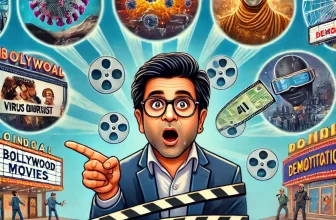Bollywood isn’t just cinema in India, it’s a cultural machine that influences how people think, dream, and even behave in real life. From how love is supposed to happen, to how villains look, to how social conflicts get resolved, movies have built a set of myths that many of us accept without questioning. While films entertain, they also create exaggerated versions of reality that seep into daily life. Over time, these portrayals turn into beliefs that don’t hold up when you look at real society.
Here are 13 widespread “dumb things” that Bollywood has made people believe, and why you need to see them for what they really are.
1. Love at First Sight Always Leads to Marriage
Bollywood thrives on the idea that one glance is enough to seal destiny. You often see a hero spotting a woman at a bus stop or market and instantly deciding she is “the one.” Songs and dramatic dialogues follow, and within a few scenes, marriage is inevitable.
In reality, relationships are built on compatibility, trust, shared values, and long-term understanding. Attraction might spark in an instant, but sustaining it requires far more. The problem with this Bollywood version is that it pressures young people to think attraction equals commitment, which is rarely the case in actual life.
2. Stalking Equals Romance
One of Bollywood’s most damaging myths is the glorification of stalking. From classics to modern hits, heroes chase heroines relentlessly, following them on streets, harassing them at colleges, and refusing to accept “no” as an answer. Eventually, the woman is shown falling in love with the man, as if persistence equals passion.
This narrative translates poorly in real life. Harassment is harassment, not romance. When movies normalize it, they contribute to a culture where consent is sidelined. For you as a viewer, it’s important to separate cinematic persistence from real-world respect.
3. Rich Boy-Poor Girl Love Story Always Works Out
From Bobby to Kabir Singh, the class-divide romance remains a Bollywood favorite. The plot usually follows a rich hero who defies his family to marry a middle-class girl, or vice versa, and love conquers all. The fantasy suggests money and status don’t matter in the end.
But you know that real life is not so simple. Marriages across economic backgrounds face pressures: family objections, social stigma, and financial adjustments. Bollywood erases these challenges and sells the idea that love alone can erase inequality. This makes young couples underestimate what it takes to sustain cross-class relationships.
4. The Hero Never Dies
Another staple of Bollywood: the hero survives anything. Bullets, car crashes, explosions, he still manages to stand up, deliver a punchline, and defeat 20 goons at once.
The result is that audiences, especially children, grow up believing in physical invincibility. Risk-taking, reckless driving, and street fights sometimes carry this cinematic bravado into real life. Realistically, violence has consequences, and humans are not superheroes. Accepting that can help you avoid dangerous behavior influenced by exaggerated screen action.
5. Violence Solves Problems
Bollywood plots often use violence as the ultimate justice system. The hero beats up criminals, corrupt politicians, or local bullies, and order is magically restored. This trope gives you the impression that aggression and muscle power can fix deep-rooted issues.
In reality, justice is a legal and social process. Violence doesn’t solve corruption, land disputes, or systemic inequality. When you believe Bollywood’s version, you start thinking of violence as power, instead of looking for peaceful and lawful solutions.
6. Police Arrive at the Last Minute
“Picture abhi baaki hai” almost always ends with police arriving right after the hero has done the heavy lifting. For decades, films have portrayed law enforcement as ineffective until the climax.
This portrayal has damaged public trust in the police. People often expect inefficiency or delay because cinema reinforces the idea that law enforcement is never proactive. In real life, while the system has flaws, police do play crucial roles beyond dramatic last-minute rescues. You need to see beyond the cinematic stereotype.
7. Running Around Trees Equals True Love
The iconic Bollywood romance scene, dancing around trees, singing in exotic locations, and expressing love through dramatic gestures, suggests that love is about fantasy.
While visually entertaining, it distorts how relationships work. Romance is not about grand gestures alone; it’s about everyday acts of care, respect, and shared responsibility. The more you let Bollywood’s fantasy define your expectations, the harder it becomes to sustain realistic connections.
8. Marriage Is the Ultimate Goal of Life
A huge number of Bollywood films end with weddings. Whether the story is about friendship, family drama, or romance, the ultimate destination is often a marriage scene.
This creates societal pressure, especially for women, that life is incomplete without marriage. It sidelines career goals, personal ambitions, and individual choices. In real life, marriage is just one option, not a universal endpoint. If you adopt Bollywood’s framing, you end up measuring success only through family validation.
9. Alcohol Is the Villain’s Signature
Bollywood built a strong stereotype: villains drink heavily, heroes remain sober or only drink in heartbreak. The bottle becomes shorthand for immorality.
This binary view distorts how society sees alcohol. It links drinking to bad character and abstinence to purity, ignoring the cultural, social, and medical realities. Alcohol is a substance, not a morality marker. Accepting this nuance helps you step away from shallow cinematic coding.
10. Women Must Sacrifice for Family Honor
From Deewar to Hum Aapke Hain Koun, female characters often give up dreams, education, or love for the sake of family honor or “izzat.” The message is clear: women should prioritize others before themselves.
This reinforces patriarchal expectations in society. Even today, many families expect daughters to behave like Bollywood heroines, silent, sacrificing, and supportive. Recognizing this trope allows you to challenge the regressive script and support real equality.
11. Rich People Are Always Evil
Bollywood has historically painted rich businessmen as villains: smugglers, landlords, corrupt industrialists. Their wealth is shown as inherently tainted.
This narrative fuels suspicion toward wealth in Indian society, as if success and corruption always go together. While inequality is real, wealth is not automatically evil. This stereotype discourages people from seeing the complexity of socio-economic issues, such as systemic poverty or policy gaps.
12. Every Village Is Waiting for a Hero to Save It
In countless Bollywood films, villages are portrayed as helpless until an outsider, usually a city-bred hero, arrives to save them from oppression.
This portrayal erases the agency of villagers, who in reality drive their own change through panchayats, grassroots movements, and local leadership. Believing this trope makes you ignore the resilience and innovation that rural India contributes every day.
13. Life Problems End with a Happy Song
Bollywood wraps up complex problems with a musical finale. Whether it’s poverty, heartbreak, or corruption, a dance sequence suggests everything ends happily if you just sing loud enough.
This leaves viewers with a shallow sense of resolution. Real-life struggles, unemployment, inequality, health crises, require long-term work and systemic solutions. The “happy song” myth makes you underestimate how difficult solving real problems can be.
Summary – Separating Reel from Real Life
Bollywood has given India unforgettable music, powerful emotions, and cultural pride. But it has also spread myths that shape how you think about love, gender, success, and justice. The challenge is not to reject cinema, but to watch it critically.
When you separate reel stories from real life, you enjoy films as entertainment without letting them script your beliefs. Appreciating Bollywood doesn’t mean absorbing its dumb myths, it means celebrating creativity while staying rooted in reality.





